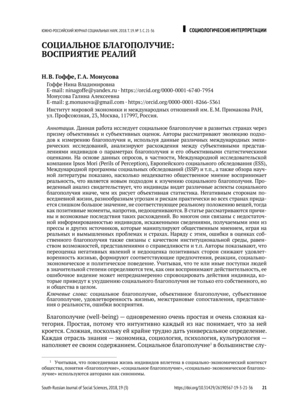Abstract
This paper studies well-being in developed countries, based on both objective and subjective estimates. We look at how approaches to evaluating well-being have changed over time. Using the data from empirical cross-country research, we analyze discrepancies between subjective perception of and objective statistical data on well-being. Based on surveys conducted by the international market research organisation Ipsos MORI, the European Social Survey (ESS), the International Social Survey Programme (ISSP), etc., as well as on academic literature, our research shows the extent of how distorted individual perception of reality is, which is a novel approach to studying social well-being. Our analysis shows that individuals see various aspects of well-being differently from how those aspects are presented in objective statistics. They generally place too much emphasis on the negative aspects of their daily lives, as well as on various threats and risks, regardless of what country they live in. At the same time, they underestimate the positive aspects. The paper discusses why these discrepancies arise and what consequences they might have for society. To a large extent, this trend is related to limited individual awareness, distorted facts presented by the media, and other sources which manipulate public opinion, playing on real and imaginary issues and fears. In addition, errors in perception of well-being are largely linked to the quality of the institutional environment, equal opportunities, views on justice, etc. We have found out that highlighting negative aspects and underestimating positive ones affect life satisfaction, influence preferences, and shape reactions, as well as social, economic and political behavior. Given that individual behavior is driven by subjective views of reality, the errors in perception might lead to decline not only in individual well-being, but also in the well-being of society at large.
Keywords
References
- Alesina, A., Stantcheva, S., & Teso, E. (2017, January). Intergenerational mobility and support for redistribution. NBER WP No. 23027. Cambridge (Mass.).
- Beutin, B., Canoy, M., Horvath, A., Hubert, A., Lerais, F., & Sochacki M. (2007, January). Reassessing the Link between Public Perception and Migration Policy. European Journal of Migration and Law, 9 (4), pp. 389–418.
- Boarini, R., Johansson, A., & d`Ercole, M. M. (2006, February). Alternative measures of well-being. Social, Employment and Migration Working Papers, 33. Paris: OECD.
- Caplan, B. (2007). The Myth of the Rational Voter: Why Democracies Choose Bad Policies. Princeton: Princeton University Press.
- Diener, E., Suh, E. M., Lucas, R. E., Smith, H. L. (1999, March). Subjective well-being: three decades of progress. Psychological Bulletin, 125 (2), pp. 276–302.
- Dontsov, A., Perelygina, E., & Rigel’, A. (2016, September/October). Ob’’ektivnoye i sub’’ektivnoye blagopoluchie: dva podhoda k issleduemoj teme [Objective and Subjective Well-being: Two Approaches to the Topic Under Study]. Voprosy psikhologii [The Issues Relevant to Psychology], 5, pp. 3–14.
- Duncan, P., Kommenda, N. (2017, December 6). Do you know the state of your country? Take the test, as poll reveals perception gap. The Guardian. Retrieved from https://www.theguardian.com/politics/datablog/2017/dec/06/perception-reality-gap-global-poll-overestimate-bad-stuff-murder-rate-prisoners-pregnancies#img-1
- Easterlin, R. A. (1974). Does economic growth improve the human lot? Some empirical evidence. New York: Academic Press.
- Gimpelson, V., & Triesman, D. (2015, May). Misperceiving Inequality. NBER. WP no. 21174. Cambridge (Mass.).
- Hamermesh, D. S. (2004, July). Subjective outcomes in economics. Southern Economic Journal, 71 (1), pp. 2–11.
- Hodge, R., & Treiman, D. (1968, October). Social participation and social status. American Sociological Review, 33 (5), pp. 722–740.
- Inglehart, R. F. (2018). Cultural evolution. People`s motivations are changing, and reshaping the world. Cambridge (UK): Cambridge University Press.
- Ipsos Mori. Retrieved from https://www.ipsos.com/ipsos-mori/en-uk/about-us
- Jackman, M., & Jackman, R. (1973, October). An interpretation of the relation between objective and subjective social status. American Sociological Review, 38 (5), pp. 569–582.
- Kahneman, D. (2011). Thinking, Fast and Slow. New York: Farrar, Straus and Giroux.
- Kahneman, D., & Tversky, A. (1979, March). Prospect theory: an analysis of decision under risk. Econometrica, 47 (2), pp. 263–292.
- Kahneman, D., Diener, E., & Schwarz, N. (Eds.). (1999). Well-being: the foundations of hedonic psychology. New York: Russell Sage Found.
- Khashchenko, B. (2011, January-March). Sub”ektivnoe Ekonomicheskoe blagopoluchie i ego izmerenie: postroenie oprosnika i ego validizatsiya [Subjective Economic Well-being and its Measuring: the Construction of the Questionnaire and its Validation]. Eksperimental’naya psikhologiya [Experimental Psychology], 4 (1), pp. 106–127.
- Kislitsyna, O. (2016). Izmerenie kachestva zhizni / blagopoluchiya: mezhdunarodnyj opyt [Measuring the Quality of Life / Well-being: International Experience] Moscow: Institut Ekonomiki RAN
- Layard, R. (2011). Happiness: Lessons from new Science. London: Penguin Group.
- OECD. Measuring Well-being and Progress: Well-being Research. Retrieved from http://www.oecd.org/statistics/measuring-well-being-and-progress.htm
- Ortiz-Ospina, E., & Max Roser, M. (2018). Happiness and Life Satisfaction. Retrieved from https://ourworldindata.org/happiness-and-life-satisfaction
- Perils of Perception 2014, 2016. Retrieved from http://perils.ipsos.com/archive/index.html
- Perils of Perception 2017. Retrieved from http://perils.ipsos.com
- Pine II, B. J., & Gilmore, J. H. (2011). The experience economy. Boston: Harvard Business School Publishing.
- Proto, E., & Rustichini A. (2014, January). GDP and life satisfaction: new evidence. Retrieved from https://voxeu.org/article/gdp-and-life-satisfaction-new-evidence
- Public Opinions and Immigration: Individual Attitudes, Interest Groups and the Media. (2010). International Migration Outlook, part III. pp. 115–156. Retrieved from http://www.oecd.org/els/mig/48328734.pdf
- Schulze, G. (2000). Die Erlebnisgesellschaft. Kultursoziologie der Gegenwart. Frankfurt / New York: Campus Verlag.
- Stigliz, J. E., Sen, A., & Fitoussi, J.P. (2010). Mis-measuring our lives. Why JDP doesn`t add up. New York: The New Press.
- Stutzer, A., & Frey, B. S. (2012, December). Recent developments in the economics of happiness: a selective overview. DP No. 7078, Bonn: IZA.
- The European social survey. Retrieved from www. europeansocialsurvey. org
- The Future of GDP. (2018, May). Zurich: Credit Suisse Research Institute.
- Understanding society. (2015). Ipsos MORI. Retrieved from https://www.ipsos.com/ipsos-mori/en-uk/understanding-society-perils-perception
- Van Praag B. (2011, March) Well-being inequality and reference groups: an agenda for new research. Journal Economic Inequality, 9, 111–127.
- Witters, D., & Liu, D. (2017, May). Income buys happiness differently based on where you live. GALLUP. Retrieved from https://news.gallup.com/opinion/gallup/210011/income-buys-happiness-differently-based-live. aspx
- World Economic Forum. (2017, January). The inclusive growth and development report 2017. Geneva: World Economic Forum.
 Русский
Русский


